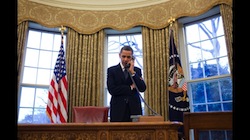Obama's Strength Advances National Security
March 31, 2010
Featured Image
We are happy to serve you a daily summary of the day's top nuclear policy stories each morning, with excerpts from the stories in bullet form.
Stories we're following today:
Obama Toughens Up - Christian Science Monitor [link]
- It was not long ago that Mr. Obama was seen as weak, both at home and abroad.
- In foreign affairs, Obama told his Russian counterpart he was ready to walk away from a nuclear arms reduction treaty rather than give in to Moscow’s demands for concessions. That tough stance saved the [New] START treaty.
- The toughness shows Obama maturing in his presidency, balancing deliberation with decisiveness.
- Abroad, Obama’s newly shown resolve may help move the United States and Russia further along the path to a “reset” in relations.
Judging the New START Treaty - Strobe Talbott and Steve Pifer in Politico [link]
- To merit ratification, the treaty must answer “yes” to three key questions: Will it enhance U.S. security? Will it allow the United States to maintain an effective nuclear deterrent? Can it be verified?We believe the treaty does all this.
- Washington will know more about Russian nuclear forces with the treaty than without it.
- Concluding the treaty should give a boost to the U.S.-Russia relationship. That may help secure greater cooperation from Moscow on challenges such as frustrating Iran’s nuclear ambitions.
Arms Control May Different On Paper and On the Ground - The New York Times [link]
- The history of arms control is replete with quirky counting rules that do not easily correspond to reality on the ground, and the “New Start” treaty completed last week is no different.
- In this case, independent experts said, each side will be able to comply with the treaty while cutting fewer nuclear weapons than it might appear on paper.
- To be sure, this treaty was never supposed to be about deep reductions.
- From the start, the administration’s main goal was to extend and update a verification, inspection and monitoring regime from the START treaty of 1991.
Nuclear Options - Foreign Policy [link]
- Politically, START has almost become the foreign policy equivalent of health-care reform, an unexpected nail-biter whose long-delayed attainment produces a massive sigh of relief.
- So what difference does it make if the United States reduces its stock of deployed strategic warheads from 2,200 to 1,550?
- The answer is that disarmament has largely become a means rather than an end.
- Even such classically realist statesmen as Henry Kissinger, George Shultz, William Perry, and Sam Nunn, who have become passionate public advocates of eliminating nuclear weapons, argue that the United States must take disarmament seriously if it is to make progress on nonproliferation.
A View from the Dark Side
Bolton Suggests New Nuclear Treaty Threatens American Sovereignty - The Washington Independent [link]
- John Bolton, an influential conservative foreign policy official for decades, accused the Obama administration of harboring “a very different view of American sovereignty than a long line of presidents, certainly since Franklin Roosevelt.”
- Advances in arms control would have “a cumulative impact on our sovereignty,” Bolton argued.
- “I think the people in places like Teheran and Pyongyang say, ‘Fantastic — the United States is coming down, let’s ramp up our production efforts to get to the [nuclear] capability even more quickly,’” Bolton said.



